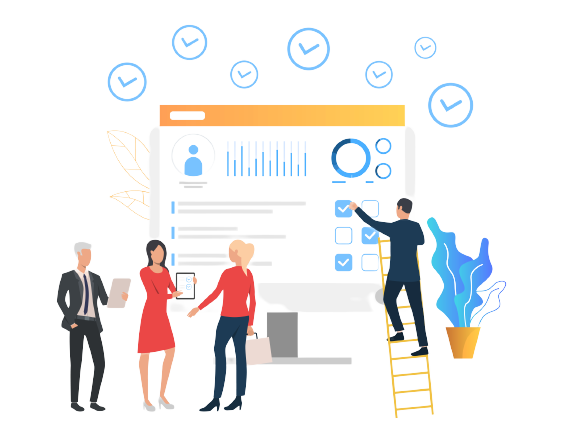
In recent years, one industry that is capturing most of our attention is the “Fintech” industry. Over the past few years, there has been a lot of hype around fintech, which is a combination of the words ‘financial technology.
Thus, we can say that this industry is booming and one can assume that it is going to dominate the entire financial market in the foreseeable future. You may find it amusing to know that India’s adoption rate for fintech products stands at 59%, which is the second-highest pace worldwide.
Fintech refers to companies that are using technology to make financial systems more efficient. It is aimed at resolving issues or challenges regarding the financial aspects of individuals, corporations, and governments. Banks are introducing digital channels for the ease of the customers. It can help them carry out all their banking activities from anywhere, anytime.
And while it is extremely exciting to be a part of this industry, there are certain challenges that need our utmost attention. Fintech is a field where getting access to and retaining the best talent is always crucial.

In India, the fintech market is growing rapidly. Recently, a report has been shared by the Research and Markets, which states that “The fintech market in India was valued at Rs 1,920.16 billion in 2019 and is expected to reach Rs 6,207.41 billion by 2025.
The market is expanding at a compound annual growth rate (CAGR) of approximately 22.7 percent during the 2020-2025 period.” A sector that is growing at this rate, needs people who like a fast-paced work environment.
As more and more customers are opting for digital payments, fintech industries will have to focus on building trust and consumer engagement. It can only be made possible if the organization has talented and skilled employees for offering customers the support they need.
A true HR personnel can train your workforce and encourage them to actively participate in activities that improve the company’s culture. Improved work culture will result in the improved delivery of the tasks, thus helping the company to grow and thrive in a competitive work environment.

Tremendous changes in technology, rapidly changing customer preferences, and regulatory framework, etc. are some of the major challenges that are being faced by the BFSI sector.
Today, numerous changes are emerging in the banking sector. The concept of universal banking and virtual banking etc has emerged and these changes tremendously affect and change the way the banking sector is competing in the market.
Various strategic postures are being adopted by banks to gain a competitive edge. And to keep up with this changing scenario, the sector needs to adopt the new methods of functioning.
The HR department of any organization is responsible for the proper functioning of the organization. However, in the Fintech sector, the HR function is not given much importance as it deserves.
Many fintech companies struggle with their management information systems and their membership databases. The root cause of this is the lack of centralized information. Too often, organizations keep separate databases for their employees and other processes.
This fragmented and incompatible data may restrain innovation and make your organization less competitive.
A slow, wobbly, or downright broken performance management system prevents the organization from achieving the major business goals. Workforce management is a tedious but important task for any organization.
Without an effective employee tracking or monitoring system, it’s difficult to know about your employee’s day to day activities. These problems increase when you deal with a remote workforce and can’t manage them in person.

HRMS or the Human Resource Management Software plays a crucial role in Fintech companies. A great HRMS can assist you in managing people, tracking attendance and working hours, processing payroll, managing taxes, etc. HRMS helps the fintech industry to streamline critical HR functions.
Listed below are some exceptional features of HR software for the fintech sector;
HR tech has simplified the process of gathering authentic and foolproof data from the employees. With the help of a robust HRMS system, the employers can gather data and can get error-free results for performing accurate payroll.
The automated and authentic mechanism is responsible for such a flawless and desired outcome.
HRMS helps in streamlining the onboarding process. HRMS solutions enable companies to determine skill sets, assign goals, and track accomplishments.
Moreover, error-free pays-slips and user-friendly or synergetic dashboards/ interfaces help you meet the increasing payroll expectations. Timely and error-free payroll keeps the employees happy and engaged, thus resulting in improved productivity.
When we talk about innovation, there’s one thing that can’t be overlooked and that is technology. If your firm runs on an idea of innovation, then the technology and approaches that you use to manage your workforce need to reflect this.
When it comes to managing and supporting your workforce, your HR system must be accessible by everyone, it should be easy to set up and use so that your people can spend more time on tasks that actually matter. With an integrated HRMS it becomes easy for your employees to stay connected through the self-service portal.
Offering free food or taking your team out during the weekends isn’t going to attract the best. The best people tend to stay in an environment where they truly feel motivated, empowered, and inspired.
A transparent and authentic performance management system boosts productivity and employee morale. This type of system that provides such an experience enables the HR personnel to accurately measure the performance of employees.
It helps them make unbiased decisions regarding appraisals or incentives.




























